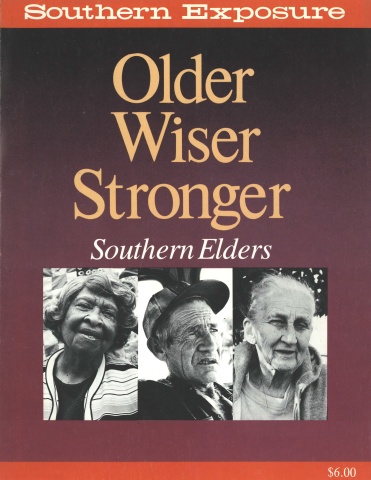Close, Close Peoples: An Interview with Hattie Adams

This article originally appeared in Southern Exposure Vol. 13 No. 2/3, "Older Wiser Stronger: Southern Elders." Find more from that issue here.
Every person fortunate enough to have known her grandparents has a unique view of history. Stories of our grandparents give us a look back to a time long past, a world dramatically different from our own. They also give us a look inward, revealing an inherited personal history that influences our way of looking at and living in this changed world.
Hattie Adams was raised in a large family in Chrystal Springs, Mississippi. She has a T-shirt that says "We are Family" and traces the Haley family tree. She often wonders if she is related to Alex Haley and plans to get in touch with him for the next family reunion. "Our family, we are close, close peoples together. " She talks here of her two grandmothers.
My father's mother, Rosetta Bridges Haley, lived to be one hundred and four. She was half white — her daddy was white and her mother was a slave. After Freedom, she said she did know some of her people on the white side; they used to come visit her.
Grandma Rose used to sit down and tell the grandchildren about how she had to come through. Most of the time she'd have me on her lap. She wanted us to know how she was in slavery time. She remembered the time when she was sold from her mother. She say when they bought her, she went one way and her mama went another way. She say that both of them was crying. That was all she ever knowed about her mother; she don't never know what happened to her.
Her master raised her. His name was Bridges. . . . She came up and had a child by the master, who forced her. When she came up pregnant, he wouldn't allow her to tell it — but the baby proved hisself, you know.
Seems like to me for a long time that the way she talked to us, it made us dislike white people. But we lived to learn better. We just figure God made everybody.
Grandma Rose married Josephus Haley. She lived well. She and her husband bought their home in the country and had a lot of land. After their children come up, they see that they all bought homes; so it was just a great big Haley settlement. Her children — her girls, married real dark men, and the boys all married dark women. My daddy had blue eyes. My mama was real dark-dark. They did that to try to bring the color back to the race. It was right smart.
My mother's mother was Annie Barnes Hampton. Grandma Ann was a midwife.
Coming up, my grandmother used to take anybody who got sick and sit up with them. I would have to take her to sick people's houses and sit there all night long. Oh, it was miserable. You had to sit there and you couldn't hardly talk to nobody, just sit and look. And if that person would pass, they would say, "Family come to the bed." Everybody had to go to the bed and watch her die, watch the last breath leave her. Well, at the beginning it kind of got to me, but I got to the place where seeing a person die wasn't no more than going to sit down to the table and eat with me. Right now, it doesn't put no effect on me to see a person die, I saw too many.
I used to have to help wash. At that time they didn't have undertakers, and we had to clean them up. I used to fix their hair and maybe powder their face. It didn't put no fear on me at all. I was small, too. She taught us how to do it.
At that time, you know if they didn't close their eyes good, you'd put a nickel on their eyes. She used to make me pull that eyelid down and put them nickels on there. That's why people used to tell you, don't put no nickels in your mouth 'cause they may have been on a dead person's eyes.
She would have us there to let us know that we had to die. When we went to the graveyard and we see them put down in the grave, we knew then there was no return.
Now, when she delivered babies, we couldn't go with her, no indeed. When my mother was having her babies, my grandma would come and they told us she brought the baby in her basket. My grandma taught the women, after the baby was born, not to go out of the house 'til that baby get a month old. You stay there 30 days, with all the cracks all daubed up — you couldn't read, you couldn't write. And didn't no man come nowhere about that house but the father. And the first time you go out, you wrap your baby and go all the way around the house once, then come back in. You were free to go after that. That was the custom.
When I say to Hattie Adams that she is lucky to have had those wonderful grandmothers, she replies, "Luck belong to the Devil, say blessed. That's what they taught us. We were blessed."
Tags
Jan Gilbert
Jan Gilbert, 35, is a newspaper feature editor, freelance journalist, and director of Patchwork, an oral history project in Mandeville, Louisiana. (1985)